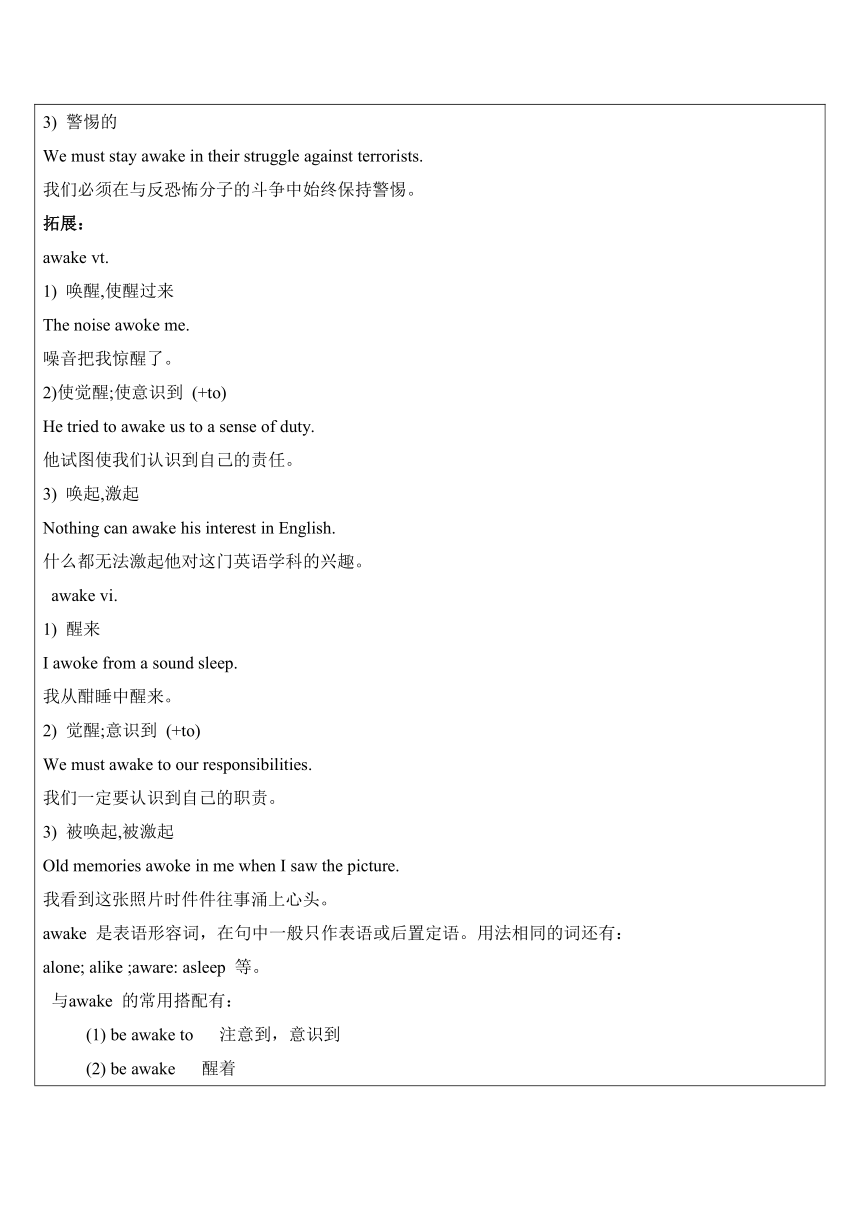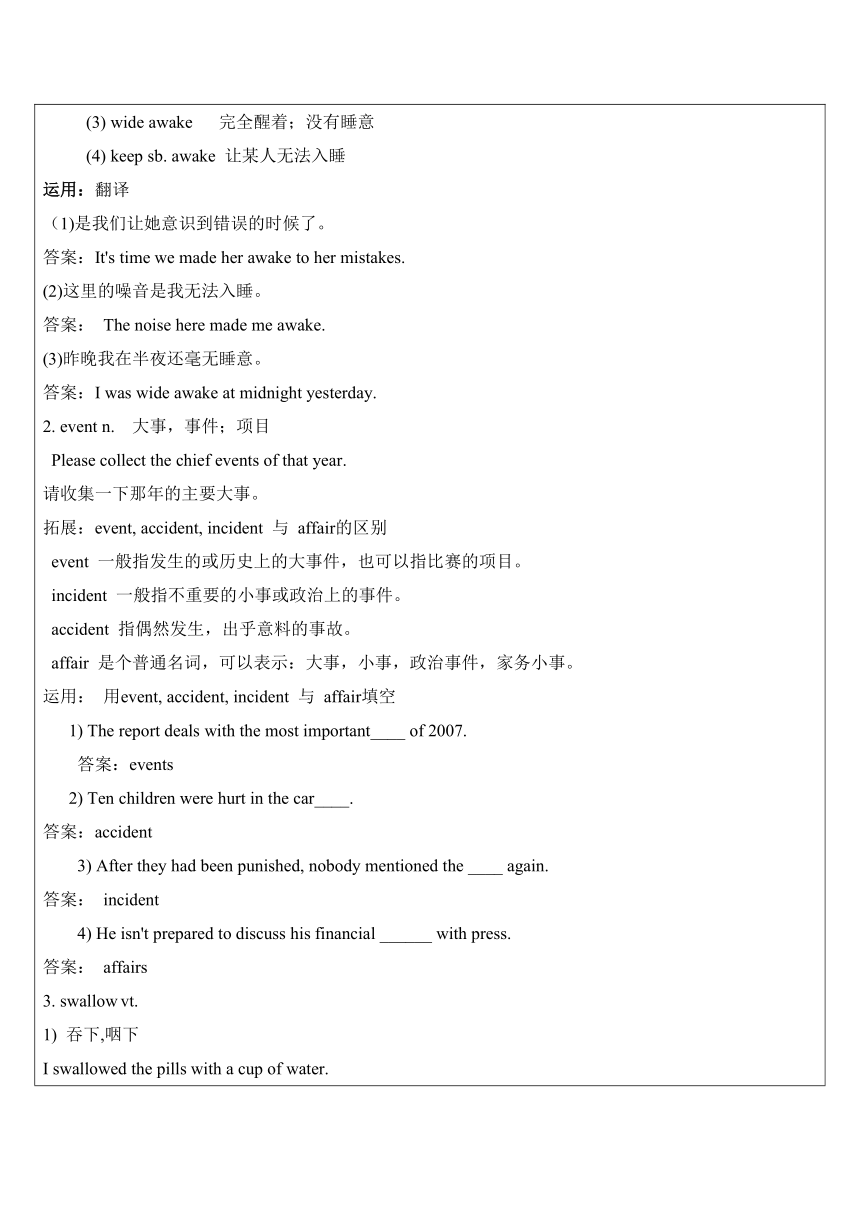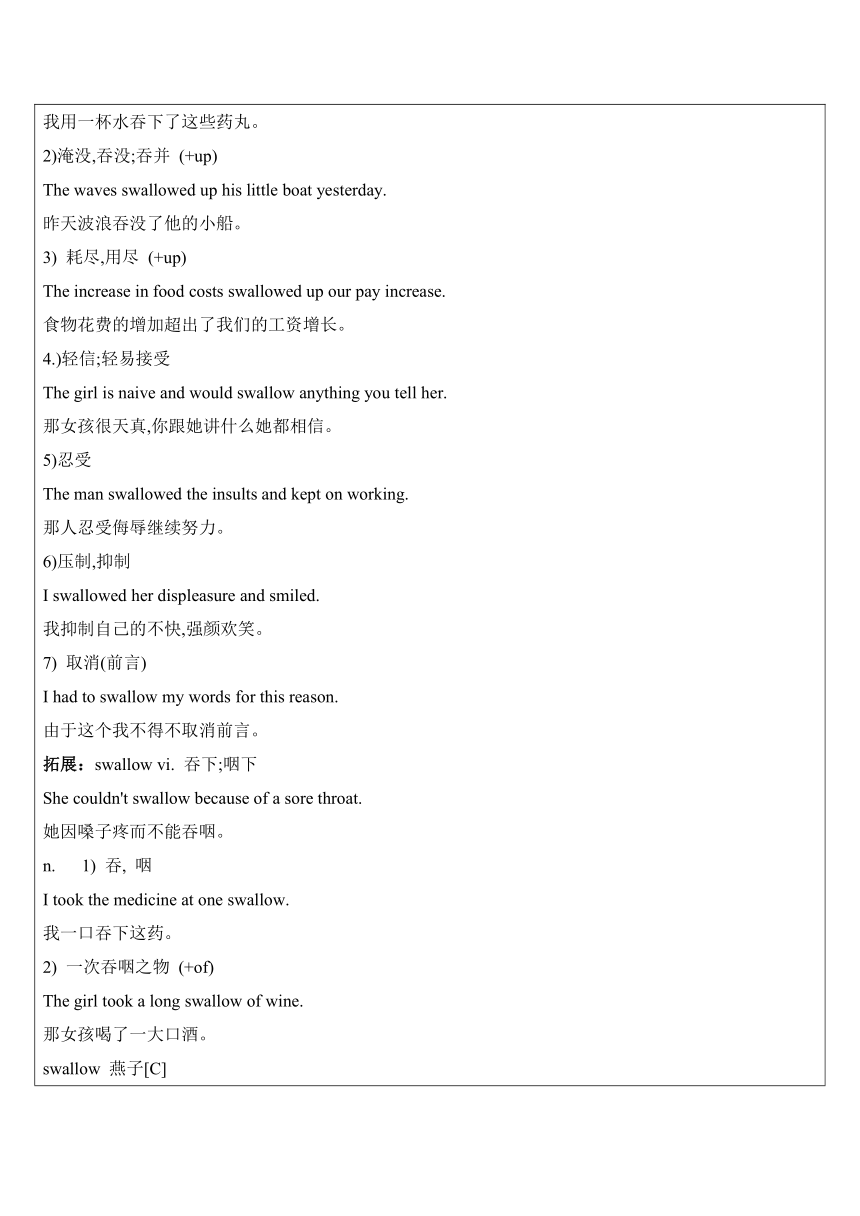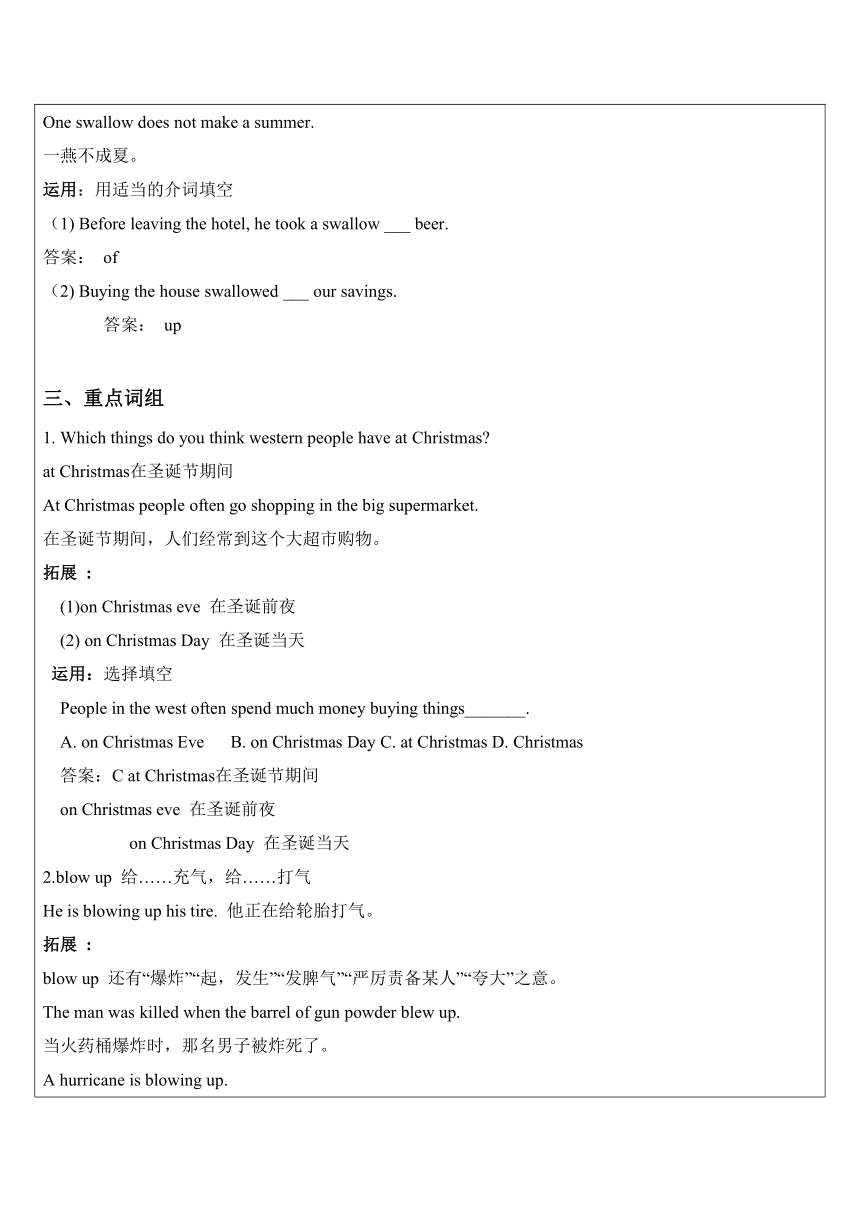高中英语北师大版必修一Unit 3 Celebration Lesson4同步教案
文档属性
| 名称 | 高中英语北师大版必修一Unit 3 Celebration Lesson4同步教案 |  | |
| 格式 | zip | ||
| 文件大小 | 32.4KB | ||
| 资源类型 | 教案 | ||
| 版本资源 | 北师大版 | ||
| 科目 | 英语 | ||
| 更新时间 | 2022-01-15 18:52:46 | ||
图片预览





文档简介
授课主题 Unit 3 Lesson 4 Christmas
教学目标 Teaching aims: 1.To read a narrative text and understand the story. 2.To build up an area of vocabulary associated with Christmas. 3.To develop reading strategies to answer multiple-choice questions. 4.To practise collocations with have, do and play. 5.To talk about childhood memories.
重点难点 Teaching important points: To learn something about Britain Christmas Teaching difficulties: To develop students’ reading ability
教学内容
一、Lead-in Step 1 warm- up Greeting everyone Step 2 review the content that was learned last class 二、重点单词 1. awake adj. 1) 醒着的 He has lain awake all night, thinking of them. 他躺着一夜没睡着,想着他们。 I lay awake in his bed. 我醒着躺在床上。 2) 认识到的,意识到的[(+to)] They are fully awake to the dangers of the situation. 他们充分意识到局势的危险。 3) 警惕的 We must stay awake in their struggle against terrorists. 我们必须在与反恐怖分子的斗争中始终保持警惕。 拓展: awake vt. 1) 唤醒,使醒过来 The noise awoke me. 噪音把我惊醒了。 2)使觉醒;使意识到 (+to) He tried to awake us to a sense of duty. 他试图使我们认识到自己的责任。 3) 唤起,激起 Nothing can awake his interest in English. 什么都无法激起他对这门英语学科的兴趣。 awake vi. 1) 醒来 I awoke from a sound sleep. 我从酣睡中醒来。 2) 觉醒;意识到 (+to) We must awake to our responsibilities. 我们一定要认识到自己的职责。 3) 被唤起,被激起 Old memories awoke in me when I saw the picture. 我看到这张照片时件件往事涌上心头。 awake 是表语形容词,在句中一般只作表语或后置定语。用法相同的词还有: alone; alike ;aware: asleep 等。 与awake 的常用搭配有: (1) be awake to 注意到,意识到 (2) be awake 醒着 (3) wide awake 完全醒着;没有睡意 (4) keep sb. awake 让某人无法入睡 运用:翻译 (1)是我们让她意识到错误的时候了。 答案:It's time we made her awake to her mistakes. (2)这里的噪音是我无法入睡。 答案: The noise here made me awake. (3)昨晚我在半夜还毫无睡意。 答案:I was wide awake at midnight yesterday. 2. event n. 大事,事件;项目 Please collect the chief events of that year. 请收集一下那年的主要大事。 拓展:event, accident, incident 与 affair的区别 event 一般指发生的或历史上的大事件,也可以指比赛的项目。 incident 一般指不重要的小事或政治上的事件。 accident 指偶然发生,出乎意料的事故。 affair 是个普通名词,可以表示:大事,小事,政治事件,家务小事。 运用: 用event, accident, incident 与 affair填空 1) The report deals with the most important____ of 2007. 答案:events 2) Ten children were hurt in the car____. 答案:accident 3) After they had been punished, nobody mentioned the ____ again. 答案: incident 4) He isn't prepared to discuss his financial ______ with press. 答案: affairs 3. swallow vt. 1) 吞下,咽下 I swallowed the pills with a cup of water. 我用一杯水吞下了这些药丸。 2)淹没,吞没;吞并 (+up) The waves swallowed up his little boat yesterday. 昨天波浪吞没了他的小船。 3) 耗尽,用尽 (+up) The increase in food costs swallowed up our pay increase. 食物花费的增加超出了我们的工资增长。 4.)轻信;轻易接受 The girl is naive and would swallow anything you tell her. 那女孩很天真,你跟她讲什么她都相信。 5)忍受 The man swallowed the insults and kept on working. 那人忍受侮辱继续努力。 6)压制,抑制 I swallowed her displeasure and smiled. 我抑制自己的不快,强颜欢笑。 7) 取消(前言) I had to swallow my words for this reason. 由于这个我不得不取消前言。 拓展:swallow vi. 吞下;咽下 She couldn't swallow because of a sore throat. 她因嗓子疼而不能吞咽。 n. 1) 吞, 咽 I took the medicine at one swallow. 我一口吞下这药。 2) 一次吞咽之物 (+of) The girl took a long swallow of wine. 那女孩喝了一大口酒。 swallow 燕子[C] One swallow does not make a summer. 一燕不成夏。 运用:用适当的介词填空 (1) Before leaving the hotel, he took a swallow ___ beer. 答案: of (2) Buying the house swallowed ___ our savings. 答案: up 三、重点词组 1. Which things do you think western people have at Christmas at Christmas在圣诞节期间 At Christmas people often go shopping in the big supermarket. 在圣诞节期间,人们经常到这个大超市购物。 拓展 : (1)on Christmas eve 在圣诞前夜 (2) on Christmas Day 在圣诞当天 运用:选择填空 People in the west often spend much money buying things_______. A. on Christmas Eve B. on Christmas Day C. at Christmas D. Christmas 答案:C at Christmas在圣诞节期间 on Christmas eve 在圣诞前夜 on Christmas Day 在圣诞当天 2.blow up 给……充气,给……打气 He is blowing up his tire. 他正在给轮胎打气。 拓展 : blow up 还有“爆炸”“起,发生”“发脾气”“严厉责备某人”“夸大”之意。 The man was killed when the barrel of gun powder blew up. 当火药桶爆炸时,那名男子被炸死了。 A hurricane is blowing up. 飓风来了。 I am sorry I blew up at you. 很抱歉,我对你发脾气。 He blew her up for her carelessness. 他斥责她因她的粗心。 His influence was greatly blown up by the media. 媒体夸大了他的影响。 运用: 选择填空 The police station was _____by the terrorists. A. blow up B. blown up C. blown down D. burnt down 答案:B blow up 有“爆炸”的意思。 3.carry on 继续,坚持,经营 carry on doing sth 相当于 go on doing sth They carried on doing the work as if nothing had happened. 他们继续在工作,好像什么都没有发生。 拓展: (1) carry on with 继续 (2) carry away 搬走,冲走,使失去理智成自制力 (3) carry out 实施,履行,完成,后常加plan, promise, order (4) carry about /around 随身携带 运用: 选择填空 (1)--It’s a good plan, but who’s going to___ it ---Tom, I think. A. carry out B. go on C. take on D. get through 答案: A carry out 实施,履行,完成,后常加plan, promise, order等。 (2)They __doing the work despite the noise. A. went on with B. carried on C. came on D. set out 答案:B carry on doing sth 继续做某事。 4. put up 1) 建造 We put up a house by the river. 我们在河边建造了一间房子。 2)供给...住宿 We can put all of you up for the night. 我们可以安排你们所有人过夜。 拓展:含有put的短语有: put off 推迟 The meeting has been put off. put up 1) 搭建 put up a house 2) 抬高 put up the price of meat 3)提供食宿 put sb. up for the night 4)提出 put up a solution put out 1)灭火Far water does not put out near fire. 远水救不了近火。 2) 生产 put out cars 3)关掉 put out the lights put on 穿上;戴上 put down v.放下, 拒绝, 镇压, 削减, 记下, 制止, 取缔 build up 和put up都有建立建设的意思. build up 可以指建立抽象的事物也可以指建立具体的事物. build up confidence in yourself建立自信心confidence就是抽象的事物。 build up a skyscraper here 在这里建设一个摩天大楼。 put up 多指建设盖起搭起一个具体的事物。 put sb down 使……出丑 put sb off 取消(与某人的见面)安排 put sb on 让某人听电话 put up with sb 容忍,忍受 set up home 安家落户 运用:翻译下列句子 (1)我们得把婚礼延期到九月举行. 答案: We've had to put our wedding off until September. (2)把玩具玩儿完了以后放进柜子里去. 答案:Put your toys away in the cupboard, when you've finished playing. (3)他大概喝了半瓶威士忌酒. 答案:He must have put away half a bottle of whisky last night. (4)以招待你过夜. 答案:. We can put you up for the night. 选择填空 (1)A New cinema___ where used to be a temple. A. has put up B. has been put up C. put up D. has been putting up 答案:B put up “建造”的意思,根据句意应该用被动。 (2)______ in 1636, Harvard is one of the most famous universities in the USA. A. Being founded B. It was founded C. Founded D. Founding 答案:C 过去分词短语作状语,放于句首。相当于Because it was founded in 1636, 5.turn off the lights关掉电灯 Please turn off the lights because I can't sleep with lights on. 请关掉电灯,因为灯开着我睡不着。 拓展: (1)turn off 关(水、煤气、电灯等) (2)turn off 拐弯,令人讨厌 (3)turn on 开水、煤气、电灯,它还有“攻击”之意 运用:选择填空 The dog suddenly ______me and bite me on the leg. A. turned on B. turn to C. turned off D. turn off 答案:A turn on 开水、煤气、电灯,它还有“攻击”之意。 6. leave sth for sb 为某人留下某物 leave sth for sb 相当于leave sb sth Please leave the cake for him. 请把这块蛋糕留给他。 拓展: (1) leave sp for sp 离开某地前往某地 (2) leave sth to/with sb 把某物交托给某人 (3) leave sth aside 不考虑某人,将某事放置一边 (4) leave sb behind 超越某人 (5) leave sth off 不把……列入,漏掉某物 运用:选择填空 He is ____Beijing _____Shanghai tomorrow. A. leave; for B. leaving; for C. leave; to D. leaving; to 答案:B leave sp for sp 离开某地前往某地。 四、重点句型 1. while conj. 拓展: (1)表对此的“而,却” He likes music, while his brother likes sports. (2)表示“尽管,虽然”相当于though/although While they are twins, they have nothing in common. (3)表时间 “当……时候”(从句的谓语动用延续性动词) I was doing my homework while my mother was watching TV. (4)表条件的“只要”=as long as 注意:常用在肯定句中。 While there is water, there is life. 运用:选择填空 (1)____ modeling business is by no means easy to get into, the good model will always be in need. A. while B. when C. As D. If 答案:A while 表示“尽管,虽然”相当于though/although (2)--I am going to the post office. --_____you are there, you can get me some stamps. A. As B. While C. Because D .If 答案:B While表示“当……时候”,从句的谓语动用延续性动词。 2.with的复合结构 With +n +形容词/副词/介词短语/不定式/现在分词/过去分词 例如: 1. He likes to sleep with the windows closed. (作状语,形容词作宾补) 2. He is standing against the wall, with his head down. (作状语,副词作宾补) 3. She came in with a book in her hand. (作状语,介词短语作宾补) 4. With a local guide leading the way, we got there easily (作状语,现在分词短语作宾补) 5. With the problem solved, we went on smoothly. (作状语,过去分词作宾补) 6. With her husband to help her, she will work it out. (作状语,不定式短语作宾补) 7. The girl with a bag on her back went happily to school. (作定语,介词短语作宾补) 拓展:运用这一结构必须注意以下几点: (1) with结构在句子中作定语或状语。 (2) with 结构中一定不用谓语动词形式,因为它不是句子。 (3) with结构中的副词是指那些无形容词形成的副词,如on,down,in,out,up,away等。 运用:选择填空 With a lot of difficult problems______ ,the newly-elected president is having a hard time. A. settled B. settling C. to settle D. being settled 答案:A 用过去分词表示动作已经完成。 五、语法点——to与for的区别 For和to这两个介词,意义丰富,用法复杂。这里仅就它们主要用法进行比较。 1. 表示各种“目的” 1. What do you study English for 你为什么要学英语? 2. She went to France for holiday. 她到法国度假去了。 3. These books are written for pupils. 这些书是为学生写的。 4. hope for the best, prepare for the worst. 作最好的打算,作最坏的准备。 2. 对于 1.She has a liking for painting. 她爱好绘画 。 2.She had a natural gift for teaching. 她对教学有天赋 3. 表示赞成同情,用不用 1. Are you for the idea or against it 你是支持还是反对这个想法? 2. He expresses sympathy for the common people.. 他表现了对普通老百姓的同情。
3. I felt deeply sorry for my friend who was very ill. 4 表示因为,由于(常有较活译法) 1 Thank you for coming. 谢谢你来。 2. France is famous for its wines. 法国因酒而出名。 5. 当事人对某事的主观看法,对于(某人),对…来说(多和形容词连用)用介词to,不用for.. He said that money was not important to him. 他说钱对他并不重要。 To her it was rather unusual. 对她来说这是相当不寻常的。 They are cruel to animals. 他们对动物很残忍。 6. 表示前往(某地)去某地,用for不用to I bought a ticket for Milan. I start for Shanghai tomorrow. 我明天去上海。 The ship is for Liverpool. 这艘船是开往利物浦的。 7. 表示到达的目的地、终点.用to不用for The bus will take you to the post office. 公共汽车会把你送到邮局去的。 He saw her to the railway station. 他把她送到火车站。 8.表示交换 1) I bought a bicycle for seven hundred yuan. 我以七百元买了一辆自行车。 2) He is willing to work for nothing. 他愿意义务地工作。 9.表示就…来说,用for He was tall for his age. 以他的年龄来说他的个子是很高的。 For so young a man he had read widely. 作为这样年轻的人,他书读的是够多了。 10.表示相应、对应,一般for 的前后用同一个名词。 Don’t translate word for word. 不要逐词翻译。 Blood for blood ! 血债血偿。 Eye for eye, tooth for tooth. 以眼还眼,以牙还牙。 To 的此种用法表示贴着,对着。 The two lovers dance cheek to cheek. 这对情侣跳贴面舞。 They stood face to face ( back to back ) 他们面对面(背对背)地站着。 ~~~~~~~~~~~~~~~~~~~~~~~~~~~~~~~~~~~~~~~~~~~~~~~~~~~~~~~~~~~~~~~
教学目标 Teaching aims: 1.To read a narrative text and understand the story. 2.To build up an area of vocabulary associated with Christmas. 3.To develop reading strategies to answer multiple-choice questions. 4.To practise collocations with have, do and play. 5.To talk about childhood memories.
重点难点 Teaching important points: To learn something about Britain Christmas Teaching difficulties: To develop students’ reading ability
教学内容
一、Lead-in Step 1 warm- up Greeting everyone Step 2 review the content that was learned last class 二、重点单词 1. awake adj. 1) 醒着的 He has lain awake all night, thinking of them. 他躺着一夜没睡着,想着他们。 I lay awake in his bed. 我醒着躺在床上。 2) 认识到的,意识到的[(+to)] They are fully awake to the dangers of the situation. 他们充分意识到局势的危险。 3) 警惕的 We must stay awake in their struggle against terrorists. 我们必须在与反恐怖分子的斗争中始终保持警惕。 拓展: awake vt. 1) 唤醒,使醒过来 The noise awoke me. 噪音把我惊醒了。 2)使觉醒;使意识到 (+to) He tried to awake us to a sense of duty. 他试图使我们认识到自己的责任。 3) 唤起,激起 Nothing can awake his interest in English. 什么都无法激起他对这门英语学科的兴趣。 awake vi. 1) 醒来 I awoke from a sound sleep. 我从酣睡中醒来。 2) 觉醒;意识到 (+to) We must awake to our responsibilities. 我们一定要认识到自己的职责。 3) 被唤起,被激起 Old memories awoke in me when I saw the picture. 我看到这张照片时件件往事涌上心头。 awake 是表语形容词,在句中一般只作表语或后置定语。用法相同的词还有: alone; alike ;aware: asleep 等。 与awake 的常用搭配有: (1) be awake to 注意到,意识到 (2) be awake 醒着 (3) wide awake 完全醒着;没有睡意 (4) keep sb. awake 让某人无法入睡 运用:翻译 (1)是我们让她意识到错误的时候了。 答案:It's time we made her awake to her mistakes. (2)这里的噪音是我无法入睡。 答案: The noise here made me awake. (3)昨晚我在半夜还毫无睡意。 答案:I was wide awake at midnight yesterday. 2. event n. 大事,事件;项目 Please collect the chief events of that year. 请收集一下那年的主要大事。 拓展:event, accident, incident 与 affair的区别 event 一般指发生的或历史上的大事件,也可以指比赛的项目。 incident 一般指不重要的小事或政治上的事件。 accident 指偶然发生,出乎意料的事故。 affair 是个普通名词,可以表示:大事,小事,政治事件,家务小事。 运用: 用event, accident, incident 与 affair填空 1) The report deals with the most important____ of 2007. 答案:events 2) Ten children were hurt in the car____. 答案:accident 3) After they had been punished, nobody mentioned the ____ again. 答案: incident 4) He isn't prepared to discuss his financial ______ with press. 答案: affairs 3. swallow vt. 1) 吞下,咽下 I swallowed the pills with a cup of water. 我用一杯水吞下了这些药丸。 2)淹没,吞没;吞并 (+up) The waves swallowed up his little boat yesterday. 昨天波浪吞没了他的小船。 3) 耗尽,用尽 (+up) The increase in food costs swallowed up our pay increase. 食物花费的增加超出了我们的工资增长。 4.)轻信;轻易接受 The girl is naive and would swallow anything you tell her. 那女孩很天真,你跟她讲什么她都相信。 5)忍受 The man swallowed the insults and kept on working. 那人忍受侮辱继续努力。 6)压制,抑制 I swallowed her displeasure and smiled. 我抑制自己的不快,强颜欢笑。 7) 取消(前言) I had to swallow my words for this reason. 由于这个我不得不取消前言。 拓展:swallow vi. 吞下;咽下 She couldn't swallow because of a sore throat. 她因嗓子疼而不能吞咽。 n. 1) 吞, 咽 I took the medicine at one swallow. 我一口吞下这药。 2) 一次吞咽之物 (+of) The girl took a long swallow of wine. 那女孩喝了一大口酒。 swallow 燕子[C] One swallow does not make a summer. 一燕不成夏。 运用:用适当的介词填空 (1) Before leaving the hotel, he took a swallow ___ beer. 答案: of (2) Buying the house swallowed ___ our savings. 答案: up 三、重点词组 1. Which things do you think western people have at Christmas at Christmas在圣诞节期间 At Christmas people often go shopping in the big supermarket. 在圣诞节期间,人们经常到这个大超市购物。 拓展 : (1)on Christmas eve 在圣诞前夜 (2) on Christmas Day 在圣诞当天 运用:选择填空 People in the west often spend much money buying things_______. A. on Christmas Eve B. on Christmas Day C. at Christmas D. Christmas 答案:C at Christmas在圣诞节期间 on Christmas eve 在圣诞前夜 on Christmas Day 在圣诞当天 2.blow up 给……充气,给……打气 He is blowing up his tire. 他正在给轮胎打气。 拓展 : blow up 还有“爆炸”“起,发生”“发脾气”“严厉责备某人”“夸大”之意。 The man was killed when the barrel of gun powder blew up. 当火药桶爆炸时,那名男子被炸死了。 A hurricane is blowing up. 飓风来了。 I am sorry I blew up at you. 很抱歉,我对你发脾气。 He blew her up for her carelessness. 他斥责她因她的粗心。 His influence was greatly blown up by the media. 媒体夸大了他的影响。 运用: 选择填空 The police station was _____by the terrorists. A. blow up B. blown up C. blown down D. burnt down 答案:B blow up 有“爆炸”的意思。 3.carry on 继续,坚持,经营 carry on doing sth 相当于 go on doing sth They carried on doing the work as if nothing had happened. 他们继续在工作,好像什么都没有发生。 拓展: (1) carry on with 继续 (2) carry away 搬走,冲走,使失去理智成自制力 (3) carry out 实施,履行,完成,后常加plan, promise, order (4) carry about /around 随身携带 运用: 选择填空 (1)--It’s a good plan, but who’s going to___ it ---Tom, I think. A. carry out B. go on C. take on D. get through 答案: A carry out 实施,履行,完成,后常加plan, promise, order等。 (2)They __doing the work despite the noise. A. went on with B. carried on C. came on D. set out 答案:B carry on doing sth 继续做某事。 4. put up 1) 建造 We put up a house by the river. 我们在河边建造了一间房子。 2)供给...住宿 We can put all of you up for the night. 我们可以安排你们所有人过夜。 拓展:含有put的短语有: put off 推迟 The meeting has been put off. put up 1) 搭建 put up a house 2) 抬高 put up the price of meat 3)提供食宿 put sb. up for the night 4)提出 put up a solution put out 1)灭火Far water does not put out near fire. 远水救不了近火。 2) 生产 put out cars 3)关掉 put out the lights put on 穿上;戴上 put down v.放下, 拒绝, 镇压, 削减, 记下, 制止, 取缔 build up 和put up都有建立建设的意思. build up 可以指建立抽象的事物也可以指建立具体的事物. build up confidence in yourself建立自信心confidence就是抽象的事物。 build up a skyscraper here 在这里建设一个摩天大楼。 put up 多指建设盖起搭起一个具体的事物。 put sb down 使……出丑 put sb off 取消(与某人的见面)安排 put sb on 让某人听电话 put up with sb 容忍,忍受 set up home 安家落户 运用:翻译下列句子 (1)我们得把婚礼延期到九月举行. 答案: We've had to put our wedding off until September. (2)把玩具玩儿完了以后放进柜子里去. 答案:Put your toys away in the cupboard, when you've finished playing. (3)他大概喝了半瓶威士忌酒. 答案:He must have put away half a bottle of whisky last night. (4)以招待你过夜. 答案:. We can put you up for the night. 选择填空 (1)A New cinema___ where used to be a temple. A. has put up B. has been put up C. put up D. has been putting up 答案:B put up “建造”的意思,根据句意应该用被动。 (2)______ in 1636, Harvard is one of the most famous universities in the USA. A. Being founded B. It was founded C. Founded D. Founding 答案:C 过去分词短语作状语,放于句首。相当于Because it was founded in 1636, 5.turn off the lights关掉电灯 Please turn off the lights because I can't sleep with lights on. 请关掉电灯,因为灯开着我睡不着。 拓展: (1)turn off 关(水、煤气、电灯等) (2)turn off 拐弯,令人讨厌 (3)turn on 开水、煤气、电灯,它还有“攻击”之意 运用:选择填空 The dog suddenly ______me and bite me on the leg. A. turned on B. turn to C. turned off D. turn off 答案:A turn on 开水、煤气、电灯,它还有“攻击”之意。 6. leave sth for sb 为某人留下某物 leave sth for sb 相当于leave sb sth Please leave the cake for him. 请把这块蛋糕留给他。 拓展: (1) leave sp for sp 离开某地前往某地 (2) leave sth to/with sb 把某物交托给某人 (3) leave sth aside 不考虑某人,将某事放置一边 (4) leave sb behind 超越某人 (5) leave sth off 不把……列入,漏掉某物 运用:选择填空 He is ____Beijing _____Shanghai tomorrow. A. leave; for B. leaving; for C. leave; to D. leaving; to 答案:B leave sp for sp 离开某地前往某地。 四、重点句型 1. while conj. 拓展: (1)表对此的“而,却” He likes music, while his brother likes sports. (2)表示“尽管,虽然”相当于though/although While they are twins, they have nothing in common. (3)表时间 “当……时候”(从句的谓语动用延续性动词) I was doing my homework while my mother was watching TV. (4)表条件的“只要”=as long as 注意:常用在肯定句中。 While there is water, there is life. 运用:选择填空 (1)____ modeling business is by no means easy to get into, the good model will always be in need. A. while B. when C. As D. If 答案:A while 表示“尽管,虽然”相当于though/although (2)--I am going to the post office. --_____you are there, you can get me some stamps. A. As B. While C. Because D .If 答案:B While表示“当……时候”,从句的谓语动用延续性动词。 2.with的复合结构 With +n +形容词/副词/介词短语/不定式/现在分词/过去分词 例如: 1. He likes to sleep with the windows closed. (作状语,形容词作宾补) 2. He is standing against the wall, with his head down. (作状语,副词作宾补) 3. She came in with a book in her hand. (作状语,介词短语作宾补) 4. With a local guide leading the way, we got there easily (作状语,现在分词短语作宾补) 5. With the problem solved, we went on smoothly. (作状语,过去分词作宾补) 6. With her husband to help her, she will work it out. (作状语,不定式短语作宾补) 7. The girl with a bag on her back went happily to school. (作定语,介词短语作宾补) 拓展:运用这一结构必须注意以下几点: (1) with结构在句子中作定语或状语。 (2) with 结构中一定不用谓语动词形式,因为它不是句子。 (3) with结构中的副词是指那些无形容词形成的副词,如on,down,in,out,up,away等。 运用:选择填空 With a lot of difficult problems______ ,the newly-elected president is having a hard time. A. settled B. settling C. to settle D. being settled 答案:A 用过去分词表示动作已经完成。 五、语法点——to与for的区别 For和to这两个介词,意义丰富,用法复杂。这里仅就它们主要用法进行比较。 1. 表示各种“目的” 1. What do you study English for 你为什么要学英语? 2. She went to France for holiday. 她到法国度假去了。 3. These books are written for pupils. 这些书是为学生写的。 4. hope for the best, prepare for the worst. 作最好的打算,作最坏的准备。 2. 对于 1.She has a liking for painting. 她爱好绘画 。 2.She had a natural gift for teaching. 她对教学有天赋 3. 表示赞成同情,用不用 1. Are you for the idea or against it 你是支持还是反对这个想法? 2. He expresses sympathy for the common people.. 他表现了对普通老百姓的同情。
3. I felt deeply sorry for my friend who was very ill. 4 表示因为,由于(常有较活译法) 1 Thank you for coming. 谢谢你来。 2. France is famous for its wines. 法国因酒而出名。 5. 当事人对某事的主观看法,对于(某人),对…来说(多和形容词连用)用介词to,不用for.. He said that money was not important to him. 他说钱对他并不重要。 To her it was rather unusual. 对她来说这是相当不寻常的。 They are cruel to animals. 他们对动物很残忍。 6. 表示前往(某地)去某地,用for不用to I bought a ticket for Milan. I start for Shanghai tomorrow. 我明天去上海。 The ship is for Liverpool. 这艘船是开往利物浦的。 7. 表示到达的目的地、终点.用to不用for The bus will take you to the post office. 公共汽车会把你送到邮局去的。 He saw her to the railway station. 他把她送到火车站。 8.表示交换 1) I bought a bicycle for seven hundred yuan. 我以七百元买了一辆自行车。 2) He is willing to work for nothing. 他愿意义务地工作。 9.表示就…来说,用for He was tall for his age. 以他的年龄来说他的个子是很高的。 For so young a man he had read widely. 作为这样年轻的人,他书读的是够多了。 10.表示相应、对应,一般for 的前后用同一个名词。 Don’t translate word for word. 不要逐词翻译。 Blood for blood ! 血债血偿。 Eye for eye, tooth for tooth. 以眼还眼,以牙还牙。 To 的此种用法表示贴着,对着。 The two lovers dance cheek to cheek. 这对情侣跳贴面舞。 They stood face to face ( back to back ) 他们面对面(背对背)地站着。 ~~~~~~~~~~~~~~~~~~~~~~~~~~~~~~~~~~~~~~~~~~~~~~~~~~~~~~~~~~~~~~~
